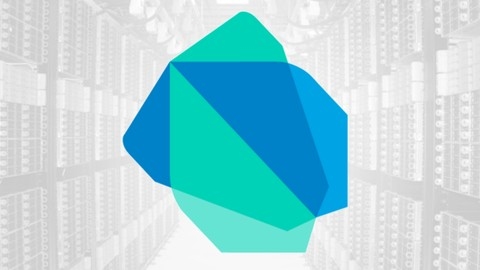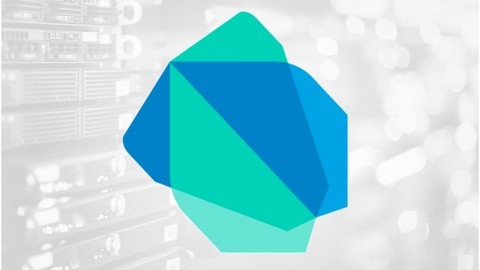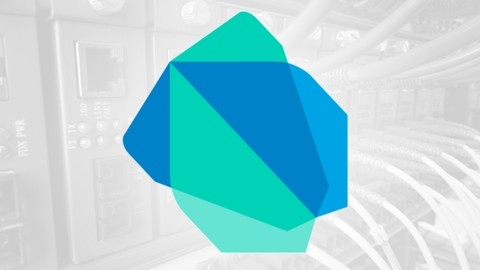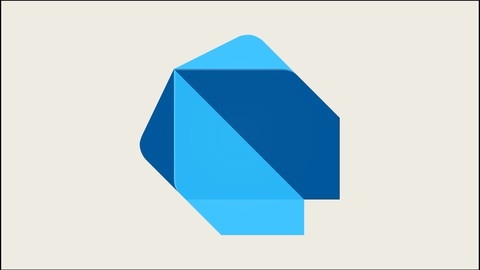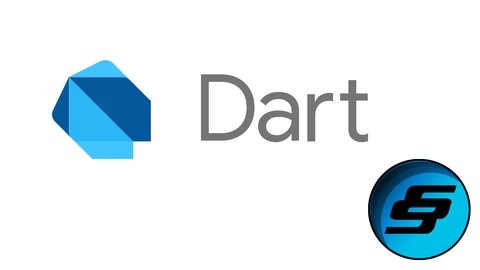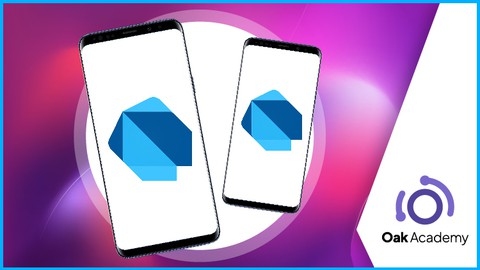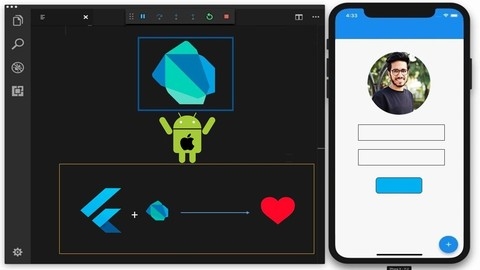Dart - Beginners Course
The course starts with an introduction to Dart, covering the latest version changes and major updates to both Dart and Flutter.
You’ll learn how to download the necessary software and set up your integrated development environment (IDE) before diving into the fundamentals with a “Hello World” program.
From there, the course takes you through the core concepts of Dart programming.
You’ll learn about variables, including booleans, numbers, strings, and const variables, as well as how to handle user input.
The course covers collections in depth, teaching you about enums, lists, sets, queues, and maps.
Flow control is a crucial aspect of any programming language, and this course covers it thoroughly.
You’ll learn about assertions, if-else statements, scope, switch statements, and various looping constructs like for-each loops.
Functions are a key part of Dart, and the course dedicates a section to them.
You’ll learn about basic functions, optional parameters, named parameters, functions as objects, and anonymous functions.
Error handling is an essential skill for any programmer, and this course teaches you how to handle exceptions in Dart using try-catch-finally blocks and how to throw your own exceptions.
Throughout the course, you’ll have the opportunity to reinforce your learning with assignment code and quizzes at the end of each section.
The course concludes with a comprehensive test to assess your knowledge of Dart.
The Complete Dart Language Guide for Beginners and Beyond
This course starts with an introduction to Dart and its basics, covering variables, data types, strings, operators, control flow statements, loops, and more.
You’ll learn how to work with collections like lists, sets, and maps, and understand the concept of null safety.
The course dives deep into functions, teaching you about arguments, return values, named and positional parameters, and advanced topics like anonymous functions, closures, and functional programming concepts.
You’ll also learn how to create and work with classes, including constructors, inheritance, interfaces, and advanced features like mixins and extensions.
Error handling and exceptions are covered, ensuring you understand how to handle errors and exceptions in your Dart code.
The course then moves on to asynchronous programming, teaching you about Futures and Streams, which are essential for building responsive and efficient applications.
One of the highlights of the course is a project where you’ll build a command-line weather app.
You’ll learn how to work with REST APIs, make HTTP requests, parse JSON data, and handle errors.
This project will give you hands-on experience in building a real-world application using Dart.
Throughout the course, you’ll work on various exercises and projects, reinforcing the concepts you’ve learned and giving you practical experience with Dart.
This course goes from the basics to advanced concepts, ensuring you have a solid understanding of the Dart language and its ecosystem.
Dart - Intermediate Course
The course covers a wide range of intermediate-level topics that are essential for mastering Dart programming.
You’ll start by diving into imports, which are crucial for organizing and managing your code.
The course also covers the latest version changes in Dart 2, ensuring that you’re up-to-date with the latest features and improvements.
One of the core topics covered is classes, which are fundamental building blocks in object-oriented programming.
You’ll learn about class constructors, the ’this’ keyword, and how to create and work with classes effectively.
Moving on, you’ll explore the concept of scope, which is essential for understanding how variables and functions are accessed and used within your code.
You’ll learn about public and private scope, as well as getters and setters, which allow you to control access to class properties.
The course also delves into polymorphism, inheritance, mixins, interfaces, and abstraction – all key concepts in object-oriented programming that will help you write more modular and maintainable code.
Generics are another important topic covered, allowing you to write reusable and type-safe code.
You’ll learn how to use generics effectively and create generic classes.
Additionally, the course covers file system operations, including working with synchronous and asynchronous operations, accessing the system’s temporary directory, listing items in directories, and reading and writing files.
Throughout the course, you’ll have the opportunity to reinforce your learning with assignments and quizzes at the end of each section, ensuring that you fully understand the concepts before moving on to the next topic.
Learn Dart Programming for Flutter
The course starts with an introduction to Dart, covering everything from installation and setup to writing your first “Hello World” program.
You’ll learn about variables, data types, strings, and how to define constants using the ‘final’ and ‘const’ keywords.
The course then dives into control flow statements, teaching you how to use if-else conditionals, switch-case statements, and various loop structures like for, while, and do-while loops.
You’ll also learn how to use break and continue statements with labeled loops.
One of the key focuses of the course is functions and methods.
You’ll learn about function syntax, properties, expressions, and how to use optional positional and named parameters.
The course also covers exception handling, including how to create custom exception classes.
Object-Oriented Programming (OOP) is a significant part of the curriculum.
You’ll explore classes, objects, instance variables, reference variables, and different types of constructors like default, named, and parameterized.
The course also covers inheritance, method overriding (polymorphism), abstract classes and methods, interfaces, and static variables and methods.
Functional programming concepts like lambdas, higher-order functions, and closures are also covered, giving you a well-rounded understanding of Dart’s programming paradigms.
The Dart Collection Framework is another important topic, where you’ll learn about lists (fixed-length and growable), sets, hash sets, maps, and hash maps.
The course even touches on callable classes, which is an advanced concept.
Throughout the course, you’ll work on practical examples and exercises to reinforce your understanding of the concepts.
Dart - Advanced Course
You will start by learning how to work with operating system variables, which is essential for building cross-platform applications.
The course also covers the latest version changes in Dart 2 and the major updates to Dart and Flutter.
Moving on, you’ll dive into async programming, a crucial concept for building responsive and efficient applications.
You’ll learn about timers, callbacks, futures, and the await keyword, which are essential for handling asynchronous operations.
The course then explores compression techniques, including GZIP and ZLIB compression, as well as working with zip files.
This knowledge is valuable for optimizing data transfer and storage in your applications.
Encryption is another important topic covered in the course.
You’ll learn about hashes, key derivation, secure random number generation, and stream and block ciphers.
These concepts are essential for building secure applications that handle sensitive data.
Socket programming is also covered, which is a fundamental skill for building networked applications.
You’ll learn about TCP servers and clients, HTTP GET and POST requests, and UDP sockets.
Finally, the course delves into database programming, covering database design, selecting rows, using queries, working with names and indexes, and handling transactions.
This knowledge is crucial for building data-driven applications that can store and retrieve data efficiently.
Throughout the course, you’ll have access to assignment sources and quizzes to reinforce your learning and ensure you’re grasping the concepts thoroughly.
The Complete Dart Development Guide
This course starts with the basics of Dart and progressing to advanced concepts like asynchronous programming and APIs.
You’ll begin by setting up your development environment on Mac or Windows, using popular IDEs like IntelliJ IDEA and VS Code.
From there, you’ll dive into the fundamentals of Dart, including variables, data types, operators, control statements, and loops.
Along the way, you’ll build a Degree App to solidify your understanding.
The course then explores essential data structures like lists, sets, and maps, as well as functions and their various types, including lambda expressions and higher-order functions.
You’ll also learn about object-oriented programming (OOP) concepts like classes, objects, inheritance, and mixins.
As you progress, you’ll delve into more advanced topics such as generics, operator overloading, polymorphism, and lexical closures.
The course even covers extension functions and callable classes, which are powerful features in Dart.
Importantly, the course dedicates a section to asynchronous programming, covering Futures, Streams, and the async/await syntax.
This is crucial for building responsive and efficient applications.
You’ll also learn how to install packages, work with APIs, and interact with the file system, which are essential skills for building real-world applications.
The course wraps up with a final project and a section on null safety, a critical feature in Dart that helps prevent null reference exceptions.
Dart Masterclass Programming Course: iOS/Android Bible
The course starts with an introduction to Dart and running code.
You’ll learn the basics like printing to the console, working with variables, data types, and operators.
From there, you’ll dive into control flow statements like conditional expressions, loops, and more.
Functions are covered in-depth, including parameters, return values, recursion, and lambda functions.
Error handling is also explained with try/catch blocks and custom exceptions.
The course covers essential collection types like lists, maps, sets, and how to iterate over them.
For object-oriented programming, you’ll learn about classes, constructors, inheritance, method overriding, and related concepts.
Some extras are also included, like working with runes, debugging, typedef, libraries, and concurrency.
The course provides additional learning resources from Dart tutorials, DEV community, Dart Academy, and Simple Programmer.
You’ll learn the core language features and object-oriented concepts.
Dart - from Novice to Expert Complete Course
The course starts by introducing you to the particularities of the Dart language.
You’ll learn how to install the Dart SDK on Windows, Linux, and MacOS.
Then, you’ll create your first Dart project and understand its structural components.
The course dives deep into the JIT and AOT compilers, explaining what they are and how they work.
You’ll also learn about Kernel, JIT, and AOT snapshots.
Moving on, you’ll explore Dart packages and how to use them effectively.
The course covers the Effective Dart rules and the analysis options file for linting your code.
Sound null safety is an important concept in Dart, and the course dedicates a section to help you understand it thoroughly.
You’ll learn about Dart variables, built-in types, functions, operators, and control flow statements.
The course provides in-depth coverage of Dart classes, including inheritance and generics.
You’ll also learn about Dart libraries and how to use private fields.
Testing is crucial for writing robust code, and the course has a dedicated section on Dart testing.
Finally, you’ll dive into synchronous and asynchronous workflows in Dart.
You’ll learn about Dart isolates, the event loop, event queues, and microtask queues.
The course covers synchronous workflows and asynchronous workflows using Futures and Streams.
The Complete Dart Language Guide for Google Flutter | Dart
You’ll start by understanding what Dart is and why it’s used, followed by setting up the necessary tools like the Dart SDK and an editor.
From there, you’ll dive into the core concepts of Dart.
You’ll learn about variables, data types, control structures like loops and conditionals, and working with operators.
The course covers getting user input from the console and writing functions, including optional and named parameters.
You’ll explore collection data structures like lists, sets, and maps, along with methods to work with them.
Object-oriented programming is a major focus, covering classes, objects, constructors, inheritance, polymorphism, and more.
The syllabus also includes functional programming concepts like lambda expressions, higher-order functions, and closures.
You’ll learn about exception handling, generic types, and asynchronous programming using futures and async/await.
Null safety, a key feature in Dart, is covered in depth, including nullable and non-nullable types, type promotion, and using the late keyword.
Throughout the course, you’ll find quizzes to reinforce your learning and hands-on examples to apply the concepts you’ve learned.
Master the Dart Language with Null Safety- For Beginners
The course starts with an introduction to Dart and Dartpad, which is a great way to get familiar with the language and its environment.
You’ll learn about strings, constants, and string interpolation, which are fundamental concepts in any programming language.
Next, you’ll dive into conditional statements like if-else, which are essential for controlling the flow of your program.
The course also covers collections like lists and maps, which are crucial for working with data structures in Dart.
Looping statements like for and while loops are covered in detail, allowing you to iterate over collections and perform repetitive tasks efficiently.
Functions are a core concept in programming, and this course dedicates two sections to understanding them, including types of arguments and parameters.
Object-Oriented Programming (OOP) is a key paradigm in Dart, and the course covers classes, objects, constructors, generic types, private variables, and inheritance.
These concepts are essential for building modular and maintainable Dart applications.
One of the most exciting aspects of this course is its focus on Null Safety.
Dart’s Null Safety feature helps prevent null reference exceptions, which are a common source of bugs in many programming languages.
You’ll learn about the null-able keyword (?), required keyword, exclamation keyword (!), and late keyword, which are all crucial for working with nullable types in Dart.
